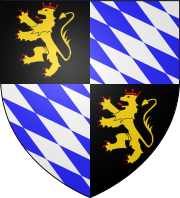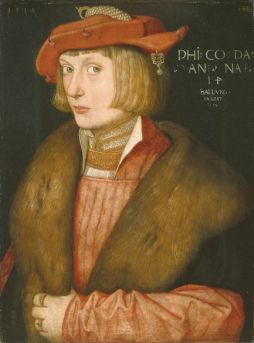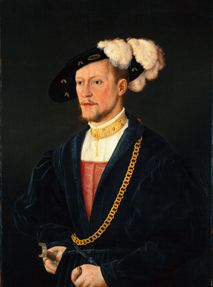Duke Phillip of Bavaria
Jump to navigation
Jump to search
UNFORGETTABLE CHARACTER QUOTES
DEFINING EPISODES | MEMORABLE SCENES
PHOTOS
Phillip, Count Palatine, Duke of Bavaria as played by Colin O'Donoghue
|
| ||||
| born 12 November 1503 - died 4 July 1548 Character's backstory: On the 8th December, 1539 there arrived in London a mysterious visitor from Germany, Phillip duke of Bavaria, a nephew of the Count Palatine who had been in England in September..... he had come promptly, in spite of the dangers of the journey and the bitterness of the weather, to ask a high favour, which he had been told there was some hope of his obtaining—the hand of the King's daughter Princess Mary Tudor. Whether this had been whispered to his uncle, the Count Palatine, when he was in England, or how the intimation was conveyed, does not appear. Neither is it recorded what passed between him and the Council for a week after his arrival; but on the 17th December, Wriothesley presented himself at Hertford Castle, where Princess Mary Tudor was then staying, and delivered to her a token from the King with a very special message....[she said] Matrimony was a "kind of religion " which she certainly had no mind to enter, especially as she evidently feared that her doing so under these circumstances would be an additional hindrance to the cause of religion itself. For the match, in fact, was only another alliance by which the King hoped to strengthen himself with the aid of German princes of the Schmalkaldic League against the Emperor Charles V; and the treaty, by which Philip engaged to take Mary as a bastard incapable of claiming any inheritance by the laws of England, was to be confirmed by his brother, Otto Henry (afterwards Elector Palatine), and his two uncles, Louis, the present Elector Palatine, and his brother Frederic, the Count Palatine, who had been so recently in England.These princes would thus be committed to a repudiation of the Pope's authority in regarding Mary as a bastard." [<a class="external" href="http://www.british-history.ac.uk/report.aspx?compid=75881&strquery=bavaria" rel="nofollow" target="_blank" title="Source : Letters & Papers - www.british-history.ac.uk">Source : Letters & Papers - www.british-history.ac.uk</a>] * In the Tudors, Phillip is portrayed as a Lutheran, but Cardinal Farnese reported to Pope Paul III that Philip was a Catholic. ( Primary source :Letters and Papers on british-history.ac.uk., vol. XIV Part 2: August-December 1539, Card Farnese to Paul III) Gentility: German noble family (<a class="external" href="http://en.wikipedia.org/wiki/Wittelsbach" rel="nofollow" target="_blank" title="House of Wittelsbach">House of Wittelsbach</a> the ruling dynasty of the German territories of Bavaria from 1180 to 1918 and of the Electoral Palatinate from 1214 until 1805) Position: Count/Duke Personality type: Persistant
Click EasyEdit to update this page! (Don't see the EasyEdit button above? <a href="../#signin" target="_self">Sign in</a> or <a href="../accountnew" target="_self">Sign up</a>.) |  
| |||
CHARACTER CONNECTIONSFamily members: Father: Rupert of the Palatinate (Phillip was his youngest son) Mother: Elizabeth of Bavaria-Landshut Uncle: Louis V, Elector Palatine Uncle : Frederic, the Count Palatine Brother: Otto Henry (who succeeded as the next Elector Palatine) Romance(s): Came to England to personally court Lady Mary Tudor, daughter of Henry VIII, in the winter of 1539/40 and again in 1543. *See article at end of profile for a more detailed account |
UNFORGETTABLE CHARACTER QUOTES
|
DEFINING EPISODES | MEMORABLE SCENES
| |
<embed flashvars="transition=Fade&site=http://tudorswiki.sho.com&imageServer=http://image.wikifoundry.com&albumId=130048" height="400" src="http://widget.wetpaintserv.us/wiki/thetudorswiki/widget/unknown/2302cc9352cef90c5b93feae300902415a625234" type="application/x-shockwave-flash" width="400" wmode="transparent"/> |
PHOTOS
 | |
 | |
 Phillip and Mary kiss. | <embed allowfullscreen="true" height="278" src="http://widget.wetpaintserv.us/wiki/thetudorswiki/widget/youtubevideo/9de03b9a6cf5350c9f382d5eb75c27a6248681d4" type="application/x-shockwave-flash" width="344" wmode="transparent"/> Source: youtube <a class="external" href="http://www.youtube.com/user/JuzTudor70AD" rel="nofollow" target="_blank">JuzTudor70AD</a> |
| Historical Information: from <a class="external" href="http://www.british-history.ac.uk/report.aspx?compid=75906&strquery=bavaria" rel="nofollow" target="_blank" title="Primary Source: Letters & papers -www.british-history.ac.uk">Primary Source: Letters & papers -www.british-history.ac.uk</a> Draft treaty between Henry VIII. and Philip count Palatine and duke of Bavaria for a marriage between the said Count and the princess Mary, incapable by the laws and statutes of the realm of claiming any succession or title by right of inheritance, as follows:— That Henry VIII., king of England and France, Defender of the Faith, and lord of Ireland, and Supreme Head of the Church, will give the lady Mary, incapable as above, to the said Philip, at his suit, who will take her as given and marry her within one month after his return to England "post fratris et patruorum suorum * * * [tra]ctatus inferius expressam." (<a class="external" href="http://www.british-history.ac.uk/report.aspx?compid=75906&strquery=bavaria#n9" rel="nofollow" target="_blank">fn. 9</a>) (2.) The King shall give with her in dote 40,000 golden florins of the Rhine, worth 3s. 4d. st. each, within one year after the public marriage, viz., 20,000 on the wedding day and the rest within a year, paid in London (<a class="external" href="http://www.british-history.ac.uk/report.aspx?compid=75906&strquery=bavaria#n10" rel="nofollow" target="_blank">fn. 10</a>) ; and moreover will give the lady Mary a life pension of 12,000 florins payable in London† half-yearly from the Michaelmas next after the marriage. (3.) That Philip shall, within three months (<a class="external" href="http://www.british-history.ac.uk/report.aspx?compid=75906&strquery=bavaria#n11" rel="nofollow" target="_blank">fn. 11</a>) after the marriage, traduct the said lady to his own home by such ways as the King shall judge best, who shall pay Philip the sum of _ (blank) towards the cost of that traduction. (4.) That each Prince shall defend the other's honour, in whatsoever company it may be, if he hear or is told of any disparaging words spoken against the other; and similarly (5.) shall give the other warning if he hear of machinations by any prince or by the bishop of Rome against him. (6.) Neither prince shall suffer his subjects to serve against the other in war. (7.) If any prince or private person shall move war against the King or any of his dominions, the Duke shall send to his assistance the number of _ (blank) horse and foot at the King's expense; and similarly (8.) shall assist the King if he shall make war for the recovery of any right of which he is defrauded. (9.) The Duke shall accept and maintain all the laws by which the power which the bishop of Rome had wickedly usurped in England has been, by pragmatic sanction, utterly extinguished. (10.) As to the laws made at the instance of the peers and people of the realm to establish the succession of the Crown, the Duke "eas leges omnes et singulas, pro se, heredibus et successoribus suis, ratas et gratas habebit, tue[bitur et defendet.] |
| from an article, 'Duke Phillip's life and death', which is an excerpt from a 1888 book about his brother: "Finally in 1539 an opportunity arose to marry King Henry VIII's daughter Princess Mary Tudor. In a conversation with Joachim Gundelfinger, a merchant from Nuremberg, Henry VIII's secretary implied that the King would like to marry his daughter to a German prince. At that Gundelfinger proposed Duke Phillip as a candidate, whom the Secretary found suitable. With Phillip's knowledge and through confidential correspondence things proceeded further and when it was indicated to him that the King would like him to visit, he traveled to England in November 1539, accompanied by Otto-Henry's comptroller, Herr Von Haydeck and his Chancellor Sebastian Pemerler. On the 6th of December he arrived via Antwerp in London and soon negotiations proceeded at a rapid pace. Phillip took offence at two articles in the marriage contract. His sense of honour made him reluctant to accept Mary as (according to an English parliament act) illegitimate and he feared to be unable to meet the demands of for a 10000 fl widow's allowance. The English were keen to erase the conscientious Duke's latter doubt by saying that the allowance would only be payable after his death and that until then his financial position could be considerably changed as he had prospects to the Dukedom. It was implied the demand for the allowance was only formal. Phillip also had some religious concerns at that point, because the contract said that he should ally himself with Henry against everyone, expect the Emperor and the Empire, but he wanted to exempt the Pope as well. Because Henry would not concede on this point, he signed the contract at Greenwich on the 24th of January 1540." "The contract was advantageous for Phillip, because while he was granted 40000 fl gold as dowry and 12000 fl in yearly installments as a pension, he had only to grant 10000 fl. to his widow. He contracted to serve the King with 4000 men on foot and 1000 on horseback against everyone, except the Emperor and the Empire and he had to accept the English statutes against papacy. The contract would be declared null and void, should he not obtain ratification of it by Otto-Henry, the elector Louis and Duke Frederik before Pentecost 1540. The betrothal was celebrated immediately and Phillip presented his bride with a diamond cross worth 2500 fl and she presented him with a ruby and diamond gem worth 1500 fl. On his parting the King gave him 7000 fl and valuable silver plates and his entourage were given handsome presents as well. On his return to Heidelberg, he at once endeavored the ratification of the contract. But the elector, by advice of the bishop of Augsburg, rejected the article stating Mary was illegitimate, partly for religious reasons and partly because of the Emperor. During the course of hopeless negotiations with the elector the time limit expired. Finally in 1541 Phillip had Gundelfinger declare in London that while he could not concede to Mary's illegitimate birth and status as a bastard, he was willing to abdicate any right of succession on Mary's part in a sub-contract. But all of Gundelfinger's efforts were in vain. On 13th of June 1541 he was informed, that a marriage would not be possible: The time limit had expired and the main articles had been rejected. At that time Phillip had also been financially ruined. His debts had grown to the immense amount of 408561 fl. His lands had to be sold off or taken over by his brother." "Phillip did not give up hope of an English marriage. Despite his brother's and the elector's advice not to, he set out to journey to England again in 1543. He had led a melancholy life in the meantime in Lengfeld, often suffering from ailments and avoiding other people, so much so that between 11th and 27th of February 1542 he had been missing, because he had secluded himself in a remote hut in the woods with only a servant and a cook. But King Henry rejected Phillip's proposal and was not very obliging and in the end demanded the return of the betrothal presents. Phillip had sold his in Antwerp though and also declared, that before God he considered himself Mary's husband, since they had sworn to each other to be no one else's at their betrothal. After this Henry expelled him from England, but still gave him 1500 fl, without which he would not have been able to leave the country. All his hopes disappointed, he stopped in August on his way home in Brussels to find employment in the Emperor's service – as always this failed. Since his brother's Otto-Henry's fortunes had turned as well and he had been forced to give up his land, it was impossible for Phillip to stay in Lengfeld. But on Otto-Henry's instigation, Frederik invited him to Heidelberg on Easter 1544 and on 8th August 1544 gave him a pension of 800 fl, which together with the pension of 600 fl. out of his grandfather's will, was his only income. This move to Heidelberg in 1545, improved his spirits, especially since under the care of the elector's physician Dr. Joh. Lang his health also improved much; he was revitalised. At that time a change had occurred in Henry VIII's politics and all of his children had been declared legitimate and in the line of succession again, so Phillip endeavored to gain an English marriage after all." "On his third appearance in England he was greeted with the utmost courtesy. He was promised a betrothal with Mary as princess and the consumption of the marriage had only one condition: a league with the elector and that efforts be made to expand the league with other electors, to further the protestant religion. To achieve this Phillip returned to Heidelberg, richly endowed with silver plates and entrusted with a military charge to recruit 25 patrols of lansquenets, for which he had been promised a monthly payment of 67154 florin. The King had given him a salary of 10000 fl and named him his commander on 19th November 1545. When he returned to Germany in 1546 he hired a number of captains and started recruiting immediately. Negotiations with the elector went less smoothly, but he sent Phillip, accompanied by Count Frederik Francis and Dr. Eustachius to England for further negotiations. Proceedings there advanced nicely and Henry decisively announced, he would marry Mary to Phillip, even though she was his heir should his son die. He only demanded 20000 fl as a widow's allowance. The King would have been satisfied with a formal promise (and no actual payment), but the elector would not agree to it. When the Count and his attendants had returned to Heidelberg to give their report, Phillip, who in England fell ill, waited in vain for an answer. In the meantime the schmalcaldic war had broken out and the elector had other problems. Phillip took some loss in it as well, because in September 1546 Neuburg had been sacked, which had lost him more than 30000 fl, even though he had no part in the war. He remained in England until Henry VIII.'s death on 28th February 1547, which destroyed all his hopes." |

